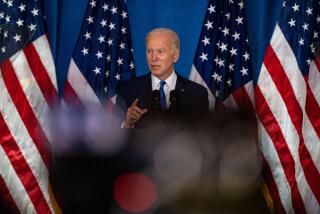Unraveling Bush’s excesses
With executive orders signed Thursday, President Obama has begun the rehabilitation of this country’s reputation when it comes to the treatment of suspected terrorists. But the orders contain ambiguities that demonstrate how hard it will be to unwind the tangle that President Bush created.
The centerpiece of Obama’s effort to turn the page on the lawlessness of the Bush administration is the closing within a year of the notorious detention center at Guantanamo Bay, Cuba. In the same order, he established a procedure to review the status of detainees still imprisoned at Guantanamo to determine who should be transferred to other countries, who should be put on trial and who are so dangerous that they cannot be prosecuted or repatriated.
Obama’s second order requires the CIA to follow the same rules governing interrogations as the U.S. military. It also outlaws CIA detention centers like the secret overseas prisons where suspected terrorists were held, without access to the Red Cross, and subjected to “enhanced” interrogation. The third order directs the attorney general, secretary of Defense and other officials to review the case of Ali Saleh Kahlah al-Marri, the only alleged “unlawful enemy combatant” being held in the United States.
All of these orders are improvements over Bush’s policies, but they include unnecessary equivocations. The order closing Guantanamo, for example, expresses Obama’s preference that detainees be tried in civilian courts or in courts-martial conducted under the Uniform Code of Military Justice. But it reserves the option of using the current, and flawed, military commission system (though perhaps with new procedures).
The order governing interrogation is similarly compromised. It rightly requires CIA interrogators to abide by the Army Field Manual, which prohibits physical force, waterboarding, extended solitary confinement, placing hoods on prisoners’ heads or using dogs to intimidate them. The order, however, seems to allow the administration to change its mind. It creates a task force to review the manual’s guidelines “to determine whether different or additional guidance is necessary for the CIA.” It isn’t.
In fairness to Obama, some issues do call for additional study, notably the question of how to deal with “high-value” detainees who, even if acquitted of war crimes, would pose a danger if released or repatriated. Obama’s order says officials will explore “lawful options” for dealing with them. That task is complicated by the fact that interrogators used waterboarding against Sept. 11 plotter Khalid Shaikh Mohammed.
Obama deserves credit for ending the worst of the Bush administration’s excesses in the “war on terror.” As he does, he should not introduce shades of gray into issues that call for black-and-white clarity.
More to Read
A cure for the common opinion
Get thought-provoking perspectives with our weekly newsletter.
You may occasionally receive promotional content from the Los Angeles Times.






